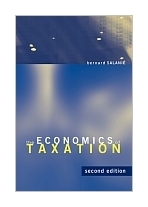|
||
• wydawnictwa polskie
• Zamów informacje o nowościach z wybranego tematu • kontakt
• Cookies na stronie |
THE ECONOMICS OF TAXATIONSALANIE B.wydawnictwo: MIT PRESS , rok wydania 2011, wydanie IIcena netto: This concise introduction to the economic theories of taxation is intuitive yet rigorous, relating the theories both to existing tax systems and to key empirical studies. The Economics of Taxation offers a thorough discussion of the consequences of taxes on economic decisions and equilibrium outcomes, as well as useful insights into how policy makers should design taxes. It covers such issues of central policy importance as taxation of income from capital, environmental taxation, and tax credits for low-income families. This second edition has been significantly revised and updated. Changes include a substantially rewritten chapter on direct taxation; a discussion of recent research in the chapter on mixed taxation; the replacement of the chapter on capital taxation with a chapter on the "new dynamic public finance"; and considerations of environmental taxation in both theory and policy chapters. The book is aimed at graduate students or advanced undergraduates taking public finance classes as well as economists who want to learn more about the topic. It combines discussion of theory, empirical work, and policy objectives in compact form. Appendixes provide necessary background material on consumer and producer theory and the theory of optimal control. Bernard Salanié is Professor of Economics at Columbia University. Table of Contents
Foreword ix Introduction 1 Some History 2 Current Tax Systems 5 Overview of the Book 8 References 11 I The Effects of Taxation 13 1 Distortions and Welfare Losses 15 1.1 The Effects of Taxation 17 1.1.1 Labor Supply 18 1.1.2 The Effects of Taxation on Savings 25 1.1.3 Taxation and Risk-Taking 30 1.2 Welfare Losses 33 2 Tax Incidence 41 2.1 Partial Equilibrium 43 2.1.1 The Effect of Payroll Taxes 43 2.1.2 The General Analysis of Partial Equilibrium 45 2.2 General Equilibrium 49 2.2.1 The No-Taxation Economy 50 2.2.2 Introducing Taxes 51 2.2.3 General Remarks 53 2.2.4 Infinitesimal Analysis 54 2.2.5 Final Remarks 60 II Optimal Taxation 63 3 Indirect Taxation 67 3.1 Ramsey's Formula 67 3.1.1 An Informal Approach 67 3.1.2 The General Model 68 3.1.3 Some Special Cases 73 3.2 Productive Efficiency 77 4 Direct Taxation 83 4.1 The Emergence of the Model 83 4.2 Mirrlees's Model 87 4.2.1 The Two-Type Case 88 4.2.2 The Rawlsian Case 94 4.2.3 The General Approach 97 4.2.4 The Quasi-linear Case 101 4.3 Generalizations 107 4.3.1 Heterogeneous Preferences and the Extensive Margin 108 4.3.2 Endogenous Wage Rates 111 4.3.3 The Income Tax as an Insurance Device 114 4.4 Simulations 115 5 Mixed Taxation 123 5.1 The Negative Income Tax 124 5.2 Is Indirect Taxation Useful? 125 5.3 Criticisms 129 6 Risk and Time 133 6.1 Taxing Savings in a Riskless Economy 135 6.2 A Stochastic Economy 137 6.3 The Inverse Euler Condition 139 6.4 Discouraging Savings 142 6.5 Optimal Taxes 144 6.5.1 Zero Aggregate Wealth Taxes 146 6.5.2 Introducing Productive Capital 147 6.5.3 Illustrations 149 7 Corrective Taxes 153 7.1 Pigovian Taxation in Partial Equilibrium 154 7.2 Optimal Green Taxes 156 7.2.1 The First-Best 157 7.2.2 The Second-Best 159 7.3 Is There a Double Dividend? 161 8 Criticisms of Optimal Taxation 165 8.1 Representing Social Preferences 165 8.1.1 Tax Reforms 166 8.1.2 Horizontal Equity 169 8.2 Putting Tax Theory to Work 172 8.2.1 Taxing Households 174 8.2.2 Behavioral Economics and Taxation 176 III Some Current Debates 179 9 Low-Income Support 181 9.1 Measuring Poverty 182 9.2 The Main Benefits 183 9.2.1 Guaranteed Minimum Income 185 9.2.2 The Negative Income Tax 185 9.2.3 Low-Wage Subsidies 186 9.2.4 The Minimum Wage 187 9.3 The Lessons from Theory 188 9.3.1 The Negative Income Tax 188 9.3.2 Low-wage Subsidies 194 9.3.3 The Guaranteed Minimum Income 194 9.3.4 The Minimum Wage 195 9.4 Empirical Evaluations 197 9.5 Recent Reforms 199 10 Taxation and Global Warming 203 10.1 The Optimal Price of Carbon 205 10.1.1 The Social Discount Rate 205 10.1.2 Catastrophic Change 210 10.1.3 Discounting Environmental Changes 211 10.2 International Issues 213 10.3 The Dynamics of Carbon Taxation 215 IV Appendixes 219 A Some Basic Microeconomics 221 A.1 Consumer Theory 221 A.1.1 Hicksian and Marshallian Demands 221 A.1.2 The Stustky Equations 223 A.1.3 Interpretation 224 A.2 Producer Theory 224 A.2.1 The Producer's Problem 225 A.2.2 Factor Demands 225 A.2.3 The Special Case of Constant Returns 227 B Optimal Control 229 Index 233 Hardcover Księgarnia nie działa. Nie odpowiadamy na pytania i nie realizujemy zamówien. Do odwolania !. |


